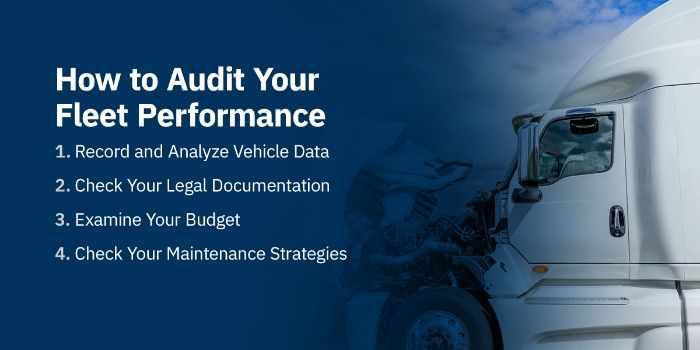
How to Audit Your Fleets Performance
Trucking and service fleets use a variety of methods to maintain fleet safety. Fleet managers need to maintain a safe work environment for drivers while on the road. From preventative maintenance to training programs, these methods maximize efficiency and security.
One key technique is a fleet audit. During these processes, you look deeper into financial history, driver safety procedures, maintenance techniques, legal compliance and more. By auditing a fleet, you ensure driver safety and compliance with legal regulations.
Importance of Auditing Your Fleet Performance
Fleet audits are crucial for driver safety and legal compliance. They help you identify issues with security, driver activity and compliance levels. Then, you can resolve them before they affect overall fleet performance.
Other benefits to your fleet include:
- Improved safety: One essential component of fleet audits is an evaluation of safety measures. You can examine employee behaviors and determine whether they follow the correct safety measures. If you discover lapses in safety procedures, you could provide additional training in safe driving behaviors. In addition, an audit could uncover problems with vehicle functions that might lead to accidents later. By catching these issues early, you can fix them before they impact drivers' safety on the road. Overall, audits can help you create a secure workspace.
- Cost savings: Audits help with financial performance. Look over previous budgets and compare them to annual spending, then find areas where you can reduce costs in the future. Analyzing vehicle performance can also help you save on expenses. If you find maintenance issues early, you can resolve them before they become more significant and more expensive problems.
- Enhanced efficiency: You can use your audits to find ways to improve existing procedures and structures. The process helps reveal slow performance in many areas. In response, you can find ways to enhance productivity, such as upgrading technology.
What You'll Need for an Audit
A trucking fleet audit and or a service fleet audit can cover a variety of issues, depending on your needs and preferences. Most audits inspect components like:
- Compliance with Department of Transportation (DOT) regulations.
- Driver safety and safety training.
- Vehicle safety and maintenance.
You'll need a few key documents and records to complete a successful audit. Here are a few examples:
- Mileage for each vehicle
- Vehicle model specifications
- Repair records
- Maintenance techniques and logs
- DOT compliance records
- Insurance information
- Employee documentation and licenses

How to Audit Your Fleet Performance
Once you've gathered the correct documents, you can begin your audit. These are four recommended areas to focus on during your audit and how to approach them:
1. Record and Analyze Vehicle Data
It's crucial to keep track of your fleet's vehicle performance. Many fleet managers start their audits with vehicle data analysis. This step allows you to detect underperforming vehicles, monitor maintenance frequency, uncover fuel efficiency rates and more.
You likely have a system in place for recording vehicle data, whether it's a digital or a paper-based solution. Your records might track features like:
- Vehicle make and model specifications
. - Annual vehicle inspection data
- Usage timesheets
- Work orders
- Maintenance checklists
. - Repair costs
. - Downtime
. - Fuel costs
.
During your audit, you can use this information to evaluate vehicle performance. For instance, you could calculate the overall cost of ownership or average cost per mile for each truck in your fleet.
With this data, you can remove vehicles and make necessary upgrades. You might notice during the audit that one truck has higher annual maintenance costs. These fees could cause you to lose money. In response, you could replace this vehicle with a newer one. That way, you can improve your fleet's efficiency by keeping it full of high-performance vehicles.
You can also use the audit as an opportunity to analyze your data-gathering techniques. If you notice you have inaccurate or incomplete vehicle records, you could implement a new methodology for the following years. For instance, a digital system can reduce manual errors and aid with analysis.
2. Check Your Legal Documentation
Legal compliance is another essential component for most fleet audits. Maintaining correct documentation for each vehicle is crucial for road checks and other compliance regulations. Without the right records, you could face fines or other complications. In addition, you need the right driver's licenses and records that certify your drivers have the necessary training to be behind the wheel.
Important compliance documents include:
- Title information for each vehicle.
- Insurance information.
- Driver certifications and commercial driving licenses (CDLs).
- Employee background checks and performance reviews.
During your fleet audit, ensure your legal documentation is updated and accurate. In many cases, you need these documents present both in vehicles and your office records.
3. Examine Your Budget
You can also analyze your spending while you complete an audit. Analyze costs like:
- Average fuel costs per vehicle.
- Maintenance costs per vehicle.
- Toll fees.
- Additional expenses for repairs.
It's often helpful to conduct a budget audit before a new fiscal year starts. That way, you can compare your previous budget to actual spending throughout the year, then update your upcoming budgets as needed.
You can also adopt new ways to decrease spending. For instance, you might notice excessive spending on toll management. In response, you could invest in a toll management solution like Bestpass to better manage these expenses.
4. Check Your Maintenance Strategies
Be sure to examine vehicle safety and maintenance procedures in your fleet. Because vehicle safety consists of many aspects, it's often helpful to use a safety auditing checklist. These are some features you can implement as part of a vehicle audit:
- Pre- and post-trip vehicle inspections by drivers
- Mileage checks and seeking the required maintenance for certain miles reached
- Monthly or quarterly maintenance reviews by your service team
By using strategies like these throughout the year, you can create an ongoing audit. These thorough measures ensure your vehicles are safe to use and can work at optimal efficiency.
Contact Bestpass Today
The power of a fleet audit can't be understated. Regular audits keep your drivers safe on the road and help you reduce expenses.
At Bestpass, we understand the importance of managing fleet costs. Our comprehensive toll payment platform serves trucking and service fleets of all industries. By investing in Bestpass software, you can simplify your toll payments, find the best discounts and analyze toll amounts. We help you find the best toll pass for your fleet.
To learn more about how Bestpass can reduce toll expenses, contact us today.


